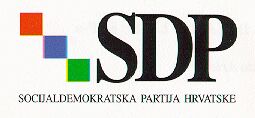Digital Road to Democracy

This is the HTML version of article published in SDP Newsletter, June 1995.


This is the HTML version of article published in SDP Newsletter, June 1995.

| Pie: | Dr.sc. Zdenko Franiæ |
| zdenko.franic@sdp.tel.hr |
The variety of physical factors that spontaneously fluctuate in the natural world generates repeated injections of randomness, allowing for unpredictability and contingency. For people such randomness amounts for a free will. However, when the collective knowledge stored outside the individual's brain serves to predict and to condition the options open to that individual, free will is endangered and democracy is lost. For many years computers were thought to be a centralizing force: whoever has access to the data, holds the reins of power. Therefore, it was believed that those in the upper levels of political hierarchy could access up-to-date files on millions of ordinary people, keeping an Orwellian eye on their domains.
Links to political sites in Croatia
Contrary, the commencement of personal computers and computer networks, like the Internet, reveals that the essential character of the computer is decentralizing. Internet could become the most effective equalizer in the education and communication. With a modem attached, even most ancient terminals (like legendary PC XT) can make worldwide connections, turning the computer into a communication, rather than a computation device.
Internet is the new frontier of 1990's, even more global than Ted Turner's CNN. In addition, it is light years more interactive. No one really "owns" it; no one really manages it. Nonetheless, over the past five years the Internet has exploded into multimedia phenomena that deserves the serious attention of anyone who wants to understand what the future has to look like.
Nothing is the same since emergence of Internet and the associated World Wide Web and Mosaic phenomena.
The informative revolution that has just begun, already started to overwhelm the World. It is exceeding one's ability to cope, reordering priorities, transforming ethics, redefining workplaces and education, invading privacy, alternating our ideas of reality pushing us to cyberspace and virtual reality. With just several "clicks" of a mouse it is possible to take any of over 350 on-line courses on Globewide Network Academy, visit 11th World Festival of Animated films in Croatia (outstanding in perfection), visit dinosaur museum in Hawaii or to find just anything regarding human rights laws, alerts and organizations.
Obviously, such decentralizing nature of the computers imposes pressure on those who hold power. They have to choose between "digital dark ages", therefore suffering dreadful economic consequences and liberating a technology that might "dangerously" open up the entire society. This kind of communications system is one of the keys to reducing international barriers to social changes.
It is hardly imaginable an economic or governmental situation that could really shut down, shut off, or cramp the multimedia phenomena, especially Internet. It's already gone beyond anyone's ability to do that. In the modern era vulnerable governments have been challenged by proliferating means of communication. The latest equipment like satellite television receivers, cellular phones, fax machines and computers linked to Internet, is diffused to such extent that it is impossible to control. Long distance telephone services helped to thwart Soviet Union, connecting dissidents and their supporters outside the country. Similarly, other communist regimes have been weakened by television and radio signals. Nowadays news about human rights abuse by Russians in Chechnya can be almost instantaneously found on gophers of human-rights organizations like Amnesty International. Also, there are several forums for discussion of the war, news updates and current events in Bosnia and Herzegovina, related to fight against Serbian aggression.
The culture of the Internet is very cosmopolitan, and people are often bound as tightly by common interests as they are by geographic location. It also has "wonderful demographic": educated and influential users that seem to have sensitive political antennae. However, it is yet another gap to be considered: between rich and poor. As the poor are already info-poor, this information superhighway should be universally accessible, much the same as current phones or road highways.
Finally, what is the age distribution of the computer (and Internet) users? According to Newsweek (27 February 1995) out of 100 million Americans who use computers (many of them with access to Internet) at home, school and work, nearly 60% are 17 or younger. No doubt, the similar situation is in Europe, including Croatia. These are the future voters.
However the most recent estimates (January 1997.) on Internet demographics and growth can be accesse at: http://www.mids.org.
In the near future a new type of political organizations, created in cyberspace are likely to emerge. Like-minded citizens, linked together instantaneously, zealous not just to find and reinforce each other but to influence (almost on-line) real events. Political leaders and their supporters will know each other more closely than ever and yet not at all.
Therefore, SDP strongly promotes the challenge to connect not only every classroom, clinic, hospital and library but also every family to Internet, and therefore to information superhighway. Free access to information and more information means more democratic society.
For illustration one should try the following UseNet groups Internet sites:
hr.politics
soc.culture.croatia
hr.fido.glasnost
WWW Servers in Croatia: Law and Politics
HIDRA, Croatian Information Documentation Referral Agency
Posljednji prepravak: 15. prosinca 2001.